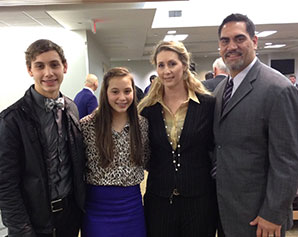The former New York Jets center wanted to do more to prepare for life after pro football, earning a master's degree in sport management.
by Cecil Harris
Nine years ago, Kevin Mawae, M.S. ’06, seemed to have it all: fame and fortune as an All-Pro center for the New York Jets, a loving wife, two adorable kids and a degree in general studies from Louisiana State University.
But Mr. Mawae wanted to do more to prepare for life after professional football—a furious sport in which an athlete’s next play could be his last.
 |
| Kevin Mawae with (from right to left) his wife Tracy, daughter Abigail and son Kirkland |
“I come from a family that stressed education, so it made sense to me to pursue a master’s degree while playing football,” said Mr. Mawae, a military brat from Savannah, Ga.
The Jets trained at Hofstra University, but Mr. Mawae lived in Garden City, near the Adelphi University campus. After careful consideration, Mr. Mawae enrolled in the sport management program in Adelphi’s Ruth S. Ammon School of Education in 2004.
“I looked at the course offerings and knew that I would get a good education at Adelphi,” Mr. Mawae said. “I also liked the diversity of classes. A lot of sport management programs lean toward the financial side. Others lean toward the compliance side. Adelphi’s curriculum was diversified enough to make it very appealing.”
Mr. Mawae took graduate courses with students a decade younger, but said he never felt out of place. Turns out, Mr. Mawae had already signed autographs for many of his classmates after Jets’ practices at Hofstra. Yet the National Football League star recalls one professor who didn’t know him at all.
“I took a course on Monday nights, and the professor said anyone who missed two classes would get a failing grade,” Mr. Mawae said. “After class, I told him I would have to miss two classes because of work. He asked me, ‘What kind of work do you do?’ I told him I play for the Jets and we have two games on Monday Night Football.”
Mr. Mawae earned an M.S. in 2006 and received the Jack Foley Award as the most accomplished student in sport management.
“Having Kevin in class was an absolute privilege,” said Daniel Bedard, Ph.D., who was Mr. Mawae’s academic adviser. “Students enjoyed his intelligent and entertaining answers from real-life situations in the world of sports. His everyday view came from an athlete who cared about his sport and the players involved.”
Mr. Mawae, 42, spent eight of his 16 NFL seasons with the Jets. As a center, he did much more than snap a football between his legs. He excelled as a blocker and chose the team’s blocking assignments on every play. Eight times his peers voted him All-Pro—the best in the league at his position. Enshrinement in the Pro Football Hall of Fame is likely when he’s eligible in 2015.
The opportunity to lead by example convinced Mr. Mawae to pursue a major role within the National Football League Players Association (NFLPA). After serving as the Jets’ player representative for six years, he was elected NFLPA president—the voice for nearly 1,700 players—in 2008 and re-elected in 2010.
NFL team owners locked out the players before the 2011 season in a dispute over how to distribute the league’s annual revenue of $9 billion. Under the leadership of Mr. Mawae and executive director DeMaurice Smith, the NFLPA decertified—a tactic that allowed players to sue the NFL, something the union could not do. Faced with a potential onslaught of lawsuits, the NFL settled with the players. The NFLPA then re-certified.
Reflecting on the benefit of his Adelphi education during those intense NFL negotiations, Mr. Mawae said, “My master’s degree gave me credibility. When I stood in front of the microphones and talked, guys would say, ‘He’s not a dumb jock. He’s very educated.’ I think that helped me set a good example for younger players.”
Mr. Mawae retired from football after the 2009 season. A sought-after public speaker, he lives in Baton Rouge, La., with his wife, Tracy, son Kirkland, 16, and daughter Abigail, 13. He has his health as well as firsthand knowledge that an advanced degree is obtainable for any pro football player.
The NFL pays up to $15,000 a year in tuition for a player to continue his education, provided he maintains a C average. Tuition is paid for three years after a player’s career ends.
“Players used to joke that the NFL offers to pay so much because they know we won’t take advantage of it,” Mr. Mawae said, laughing. “When my teammates found out I had gone back to school, they asked me, ‘How do you find the time?’ But in the off-season, you work until 12:00 noon on conditioning and then you’re off for the rest of the day. There’s time.”
For further information, please contact:
Todd Wilson
Strategic Communications Director
p – 516.237.8634
e – twilson@adelphi.edu